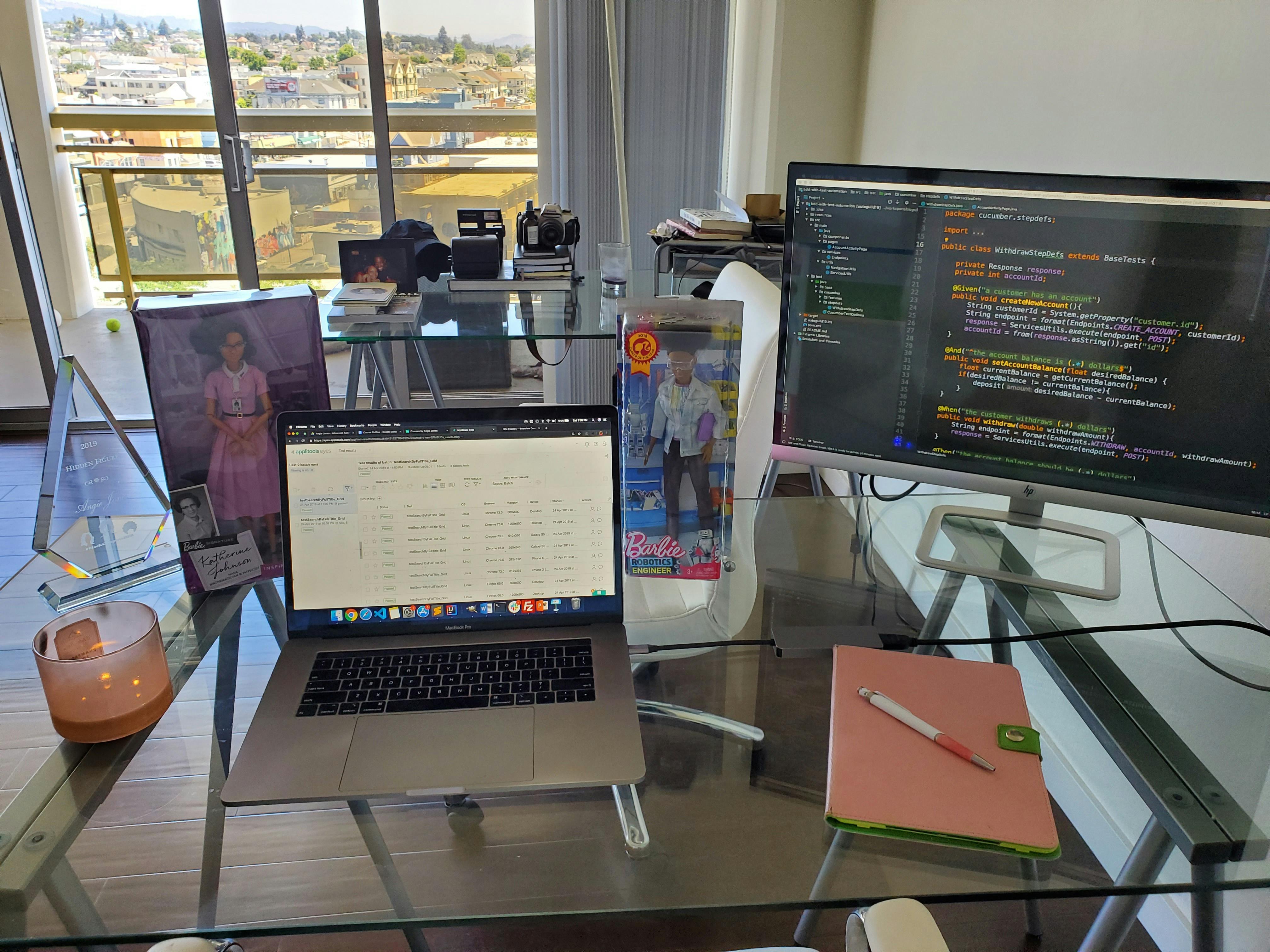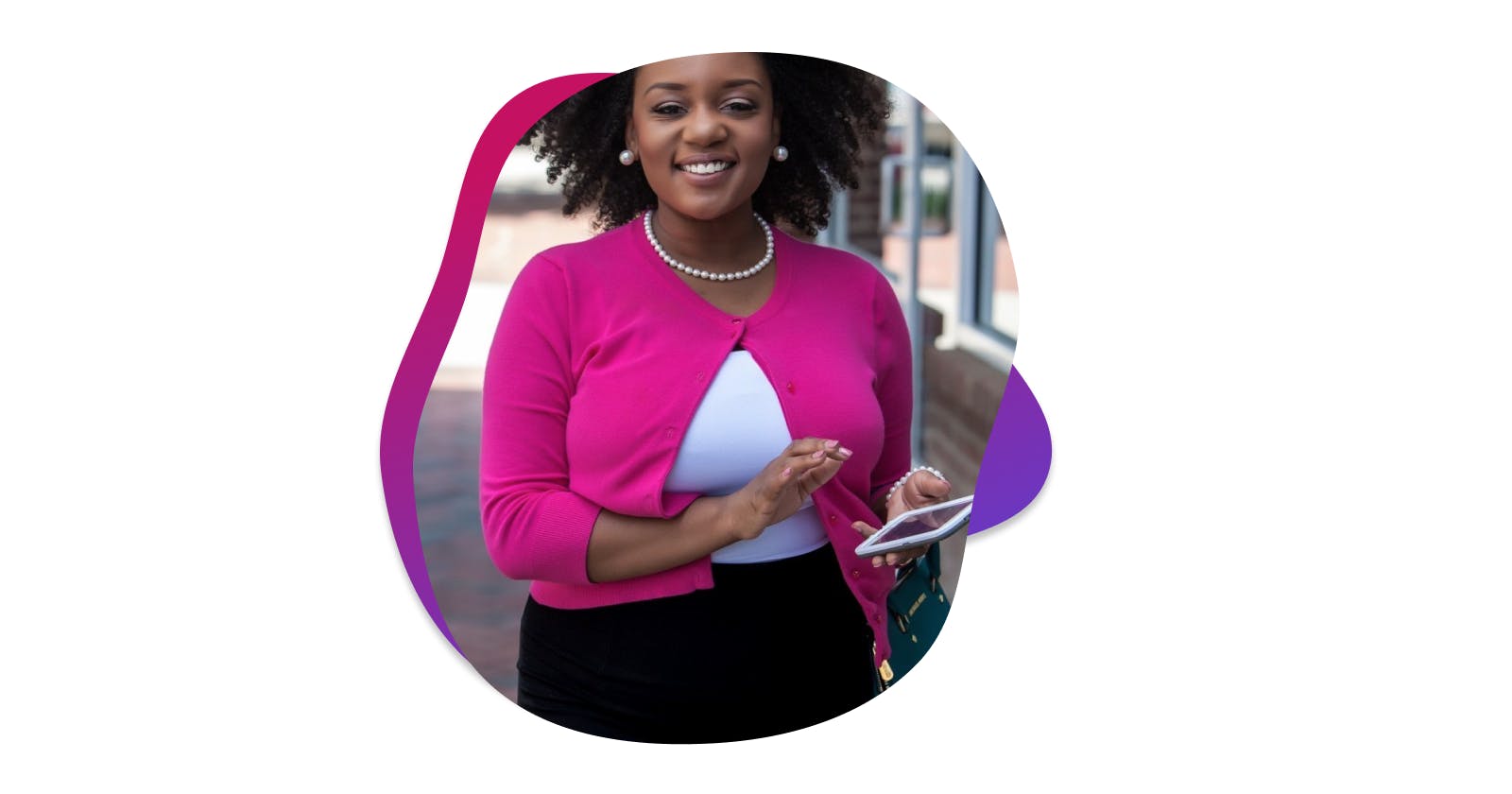Hello, Awesome 👋,
Thanks for taking out time to read this interview. This series is all about talking to the awesome women in tech and understanding the current health of the tech industry. If you want to share your story, please reach out to me at bolaji@hashnode.com.
Today we will be interviewing Angie Jones 👩💻.
Angie is a Senior Developer Advocate at Applitools who specializes in test automation strategies and techniques. She shares her wealth of knowledge by speaking and teaching at software conferences all over the world, as well as and leading the online learning platform, Test Automation University. In her spare time, Angie volunteers with Black Girls Code to teach coding workshops to young girls in an effort to attract more women and minorities to tech.
I interview leading women developer every week and showcase their history, opinions and advice on the tech. In case you missed our previous interviews, check out the " She Inspires " series on Hashnode. Also, if you find this interview useful, please don't forget to share with your friends and colleagues. 😃
Please tell us a little bit about yourself. How and when did you venture into tech?

Source: https://angiejones.tech/
Angie: Upon entering college, I wasn't exactly sure what I wanted to do with life. My father suggested that I take at least one computer course as he recognized tech was an emerging space. I enrolled in a C++ course and fell in love with coding.
What difficulties have you faced on your way in tech? Have you ever felt like you were not treated as equal?
Angie: My university, Tennessee State University, is an HBCU (Historically Black Colleges and Universities). So, I was fortunate enough to learn tech surrounded by others who had similar stories to mine. No one there had been coding since they were 7 years old, so there wasn't that intimidation factor that I've witnessed in lots of other programs. This gave me a great foundation and I felt confident in my abilities. Upon graduation, I went to work for a Fortune 500 company and the environment was much different than my college days. All of a sudden, I was now working with no one who looked like me. Most were much older and more experienced as well. I began to feel insecure. I hesitated to speak up in meetings or brainstorming sessions. I kept my head down and did my work. This was horrible for my career. The feedback I received was that I didn't show initiative and I wasn't engaged with the team. Perhaps anyone in my situation would have received the same type of feedback, but as the only woman of color on those teams, there were additional hurdles I had to jump in order to fit in.
We see that you've worked at Twitter and IBM before moving to Applitools, what was your experience at these companies before moving to Applitools and why did you make the shift?
Angie: I started my career at IBM and worked there for 9 years. The company is very innovative, and while there, I actually secured 25 patents for my ideas. This was after I learned how to come out of my shell and actually speak up and share my ideas, no matter how different and wild they may seem lol. I learned a lot at IBM and had the chance to work on some cutting edge technologies, however, many of them never saw the light of day. Growing weary of working on cool stuff that never actually shipped, I left to work on products that people actually used. I worked for a few companies in the big data and legal verticals, before deciding that I wanted to work on something fun and exciting to me. That's what led me to Twitter. I love the product. It's fun, entertaining, and yet extremely impactful. You don't have to look far to find people who have gained multiple opportunities on Twitter. You also see social movements that have transformed culture. This was my dream job and I loved every moment of it. I left Twitter because I was interested in doing Developer Relations and they did not have an opportunity for me to do that there. I love giving back to the community and helping other developers. While at Twitter, I was speaking and blogging on the side, but it became a lot to manage. So, I joined Applitools as a Developer Advocate and now I get to help developers full-time.
We see that you specialize in test automation strategies and techniques. Do you think people know well enough about this field in tech?
Angie: Not at all! As an industry, we have been struggling to get this right for decades. Most teams fail at test automation initiatives because the developers are given the time they need to build out features AND tests. It's really a development project in and of itself and yet, most teams treat it as a side project. This is a recipe for failure.
We love your works at Test Automation University, what do you do at TAU?
Angie: Thank you! Test Automation University is an answer to the problems I discussed above. This platform offers free courses on how to do test automation right! I'm so grateful for my company, Applitools, who sponsors this initiative so that engineers can learn test automation for free. I'm the program director at TAU, so I create the curriculum and seek out industry experts to teach the courses I've identified. I work with them from the initial idea all the way through production, helping them create high-quality material. I also teach there myself. I have released 3 courses so far:
- Setting a Foundation for Successful Test Automation
- Java Programming
- Automated Visual Testing
And I have 3 more of my courses that I plan to release this year.
If there is a bias women face, why do you think it is still there, in the 21st century? What are some things people and organizations could do to change this?
Angie: I have a fascinating talk where I take people on a trip to the 80s. This is where the bias began - when the PC became mainstream. The PC was targeted towards boys. You saw it in the ads, media, and pop culture during that time. That marketing played a profound effect on the decline of women studying computer science, as shown by a study by NPR. We never recovered from this. One way to change this is to change the narrative that tech is a man's sport. I volunteer with organizations such as TechGirlz and Black Girls Code who are championing this cause. I think back to when I first started coding in University. I had no idea that the field looked the way that it did because I went to an HBCU so my classrooms did not reflect the gender disproportion of the industry. This afforded me a safe space to learn coding. I think the same is true of these organizations. Once you've gained the confidence that this actually for you and you can do this, you can take those skills almost anywhere and flourish.
What do you think needs to be done to encourage beginner developers to learn programming languages and continue learning?
Angie: Beginner developers need support. Learning to code is hard, especially if you're doing it alone. If you're learning in a traditional classroom, be sure to network with the other students. Do homework together. Discuss the problems. If you're learned online, it's very easy to get discouraged. Find chat spaces with others who are on a similar journey and use that space to encourage one another. Twitter also makes the experts accessible to you (reason #49948 why I love Twitter). Find the experts in whatever it is you're learning and consume their content. Ask them questions if you need to. The key is to not do it alone.
We see that you speak and teach at software conferences all over the world, how did you get into public speaking and how has it affected your career?
Angie: I went to a software conference and at this particular conference, I didn't learn much of anything new. Instead of ragging on the conference, I thought to myself "well maybe you should be up there speaking!". I noted it as a mental todo but didn't really take any action toward it. That was until I was scrolling my Twitter timeline (gotta love Twitter) and saw an advertisement promoting a conference speaker. The speaker was a Annyce Davis, a black women with dreads. This stopped me in my tracks! I'd never seen a black woman speak at a technical conference. I didn't know what this conference was but I knew I had to go! Fortunately for me, that conference happened to be Write/Speak/Code. A conference for women and other marginalized genders to learn all there is about becoming a technical speaker, writer, and contributor to open source. It was exactly what I needed. This conference changed my life. I left there on fire and ready to share my voice with the world! I did just that. Within a couple of weeks after the conference, I launched my blog angiejones.tech ; and a few months later, I spoke at my first conference. By the end of that same year, I was speaking internationally. My career has really skyrocketed since then.
What advice would you give to aspiring programmers who look forward to speaking at meetups and/ or conferences?
Angie: We're ready to hear your stories! Evaluate your experiences thus far and find the interesting situations that you've been in. People would LOVE to hear about it. How did you/your team solve a problem? What key lessons have your learned so far? These types of things make for great talks because they are relatable.
What advice would you give to aspiring programmers who look forward to working for companies like Twitter or IBM?
Angie: These companies desperately need your voice, your ideas, your talents. They would be lucky to have you. Show them that. Keep grinding. Keep building. Then go for it! You are prepared.
What are your favorite programming tools?
Angie: I dabble in several programming languages, but Java is my true love. I use IntelliJ and VS Code as my IDEs.
What does your development environment look like? Could you please share a photo? :)

Angie: This is my home development setup. I have a black Robotics Engineer barbie and a Katherine Johnson barbie which both cheer me on as I code. Katherine Johnson is the NASA mathematician whose calculations were instrumental in sending the first American to space. She was featured in the movie Hidden Figures. I have her next to my very own Hidden Figure award which I received this year from blackvomputeHer for my innovations. I enjoy a scented candle burning while I code. It helps me to zone in. And then there's the beautiful view from my apartment overlooking Oakland, CA.
Finally, what would be your message to women trying to get into technology?
Angie: We are waiting for you with welcome arms! The work is tough, the industry is tougher - but the powerful things that you can do with tech make it all worthwhile. You belong.
Did you find Angie's story useful? Write down your thoughts in the comments section below and don't forget to share. You can follow Angie on Twitter.
See you next time 👋.

